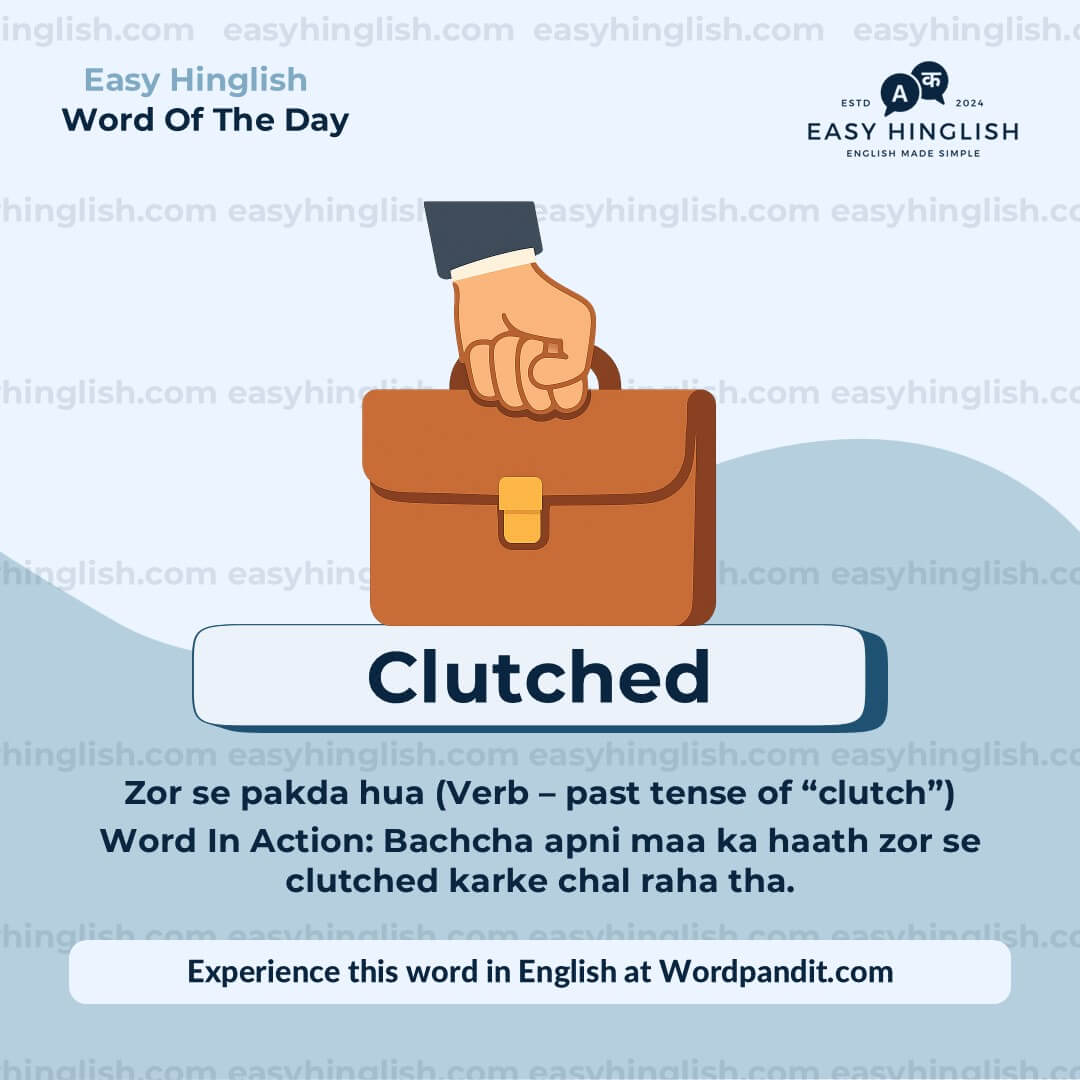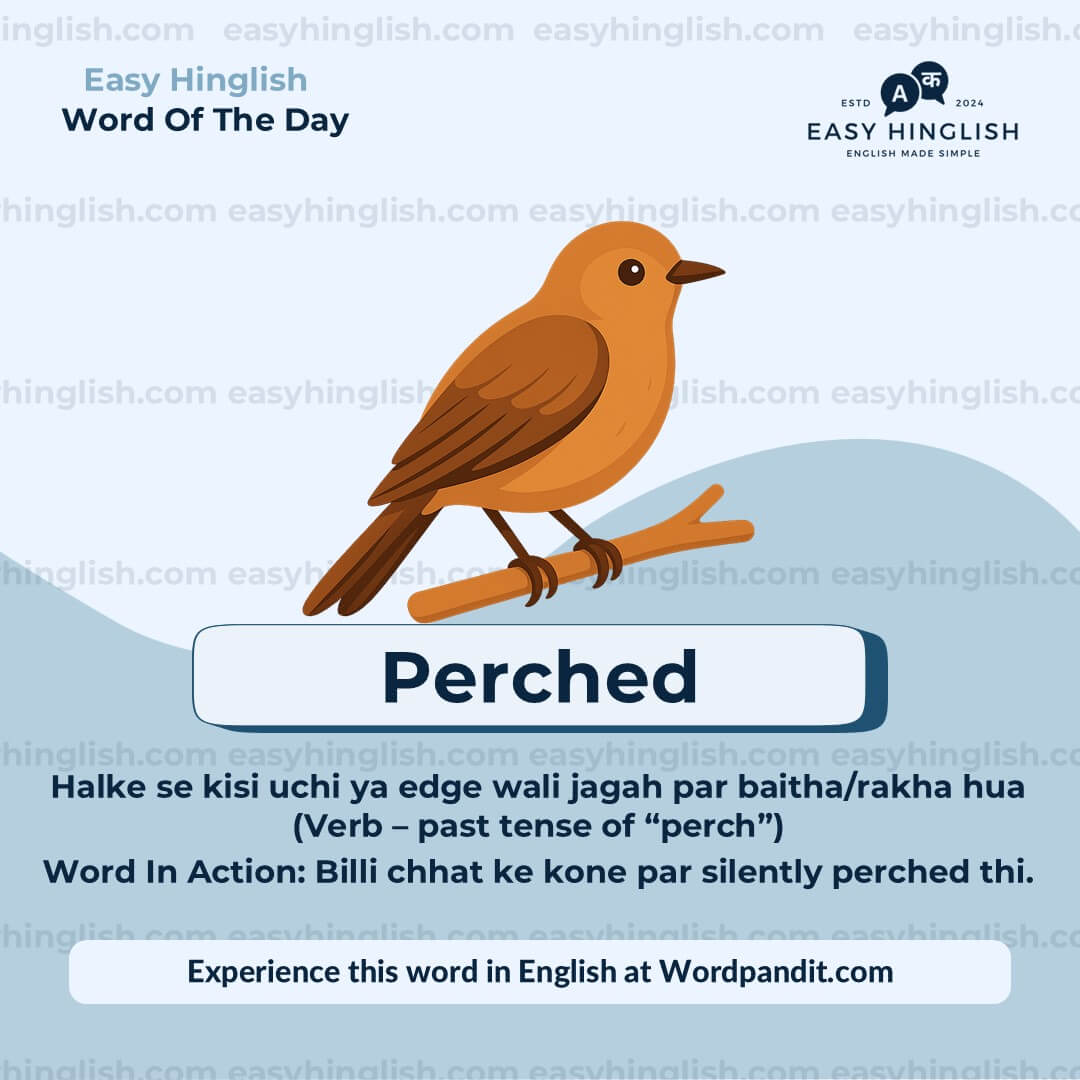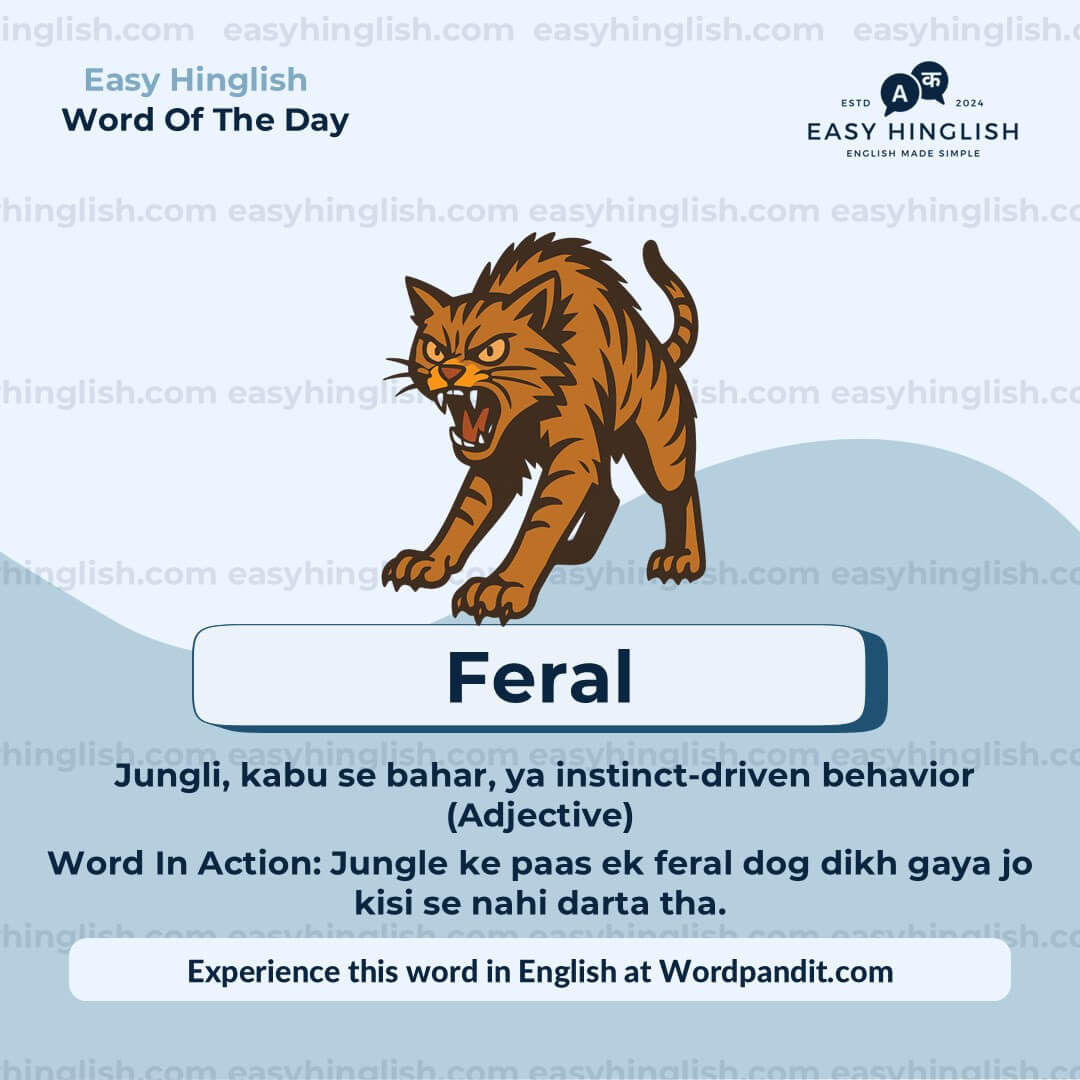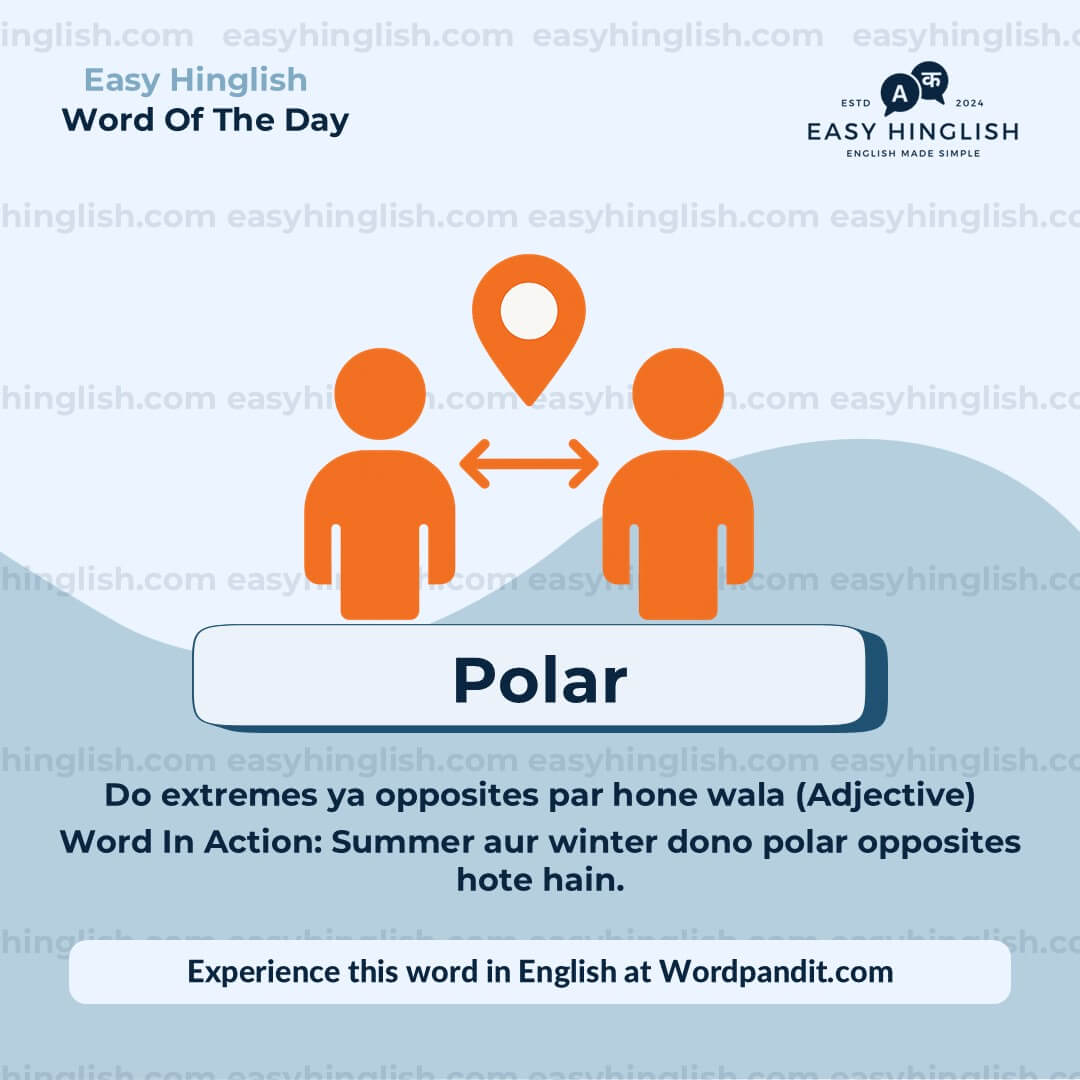Daily Vocabulary International Newspapers aur Publications se Seekho
Wordpandit ke Global Vocabulary Hub ke Saath Apni Vocabulary Expand Karo
Wordpandit par, hum aapko ek truly global vocabulary develop karne me madad karte hain, jo duniya ke sabse respected international publications se li gayi hoti hai. Yeh section aapko naye words se introduce karne ke liye design kiya gaya hai jo global conversations aur trends ko define karte hain.
Global Sources ka Power
Aapko globally sochne aur communicate karne me madad dene ke liye, hum vocabulary curate karte hain world ke top international sources se, jaise:
- The New York Times
- The Washington Post
- BBC
- The Guardian
- The Economist
- Scientific American
- Psychology Today
- Aur bhi bahut saare...
Globally Socho, Competitively Seekho
Hamare daily updates se aap international publications ke naye words seekhoge jo global news aur developments se jude hote hain. Isse aapki vocabulary current bhi rahegi aur globally relevant bhi.
Apni Global Soch Ko Expand Karo
Agar aap international exams ki tayari kar rahe ho, global business communication me excel karna chahte ho, ya sirf apni language skills improve karna chahte ho, toh Wordpandit aapko global level pe grow karne ke liye best resources provide karta hai.
Smart Learning, Global Reach
Hamari learning methodology me global examples, memory aids, aur interactive activities shamil hain, jo naye words ko effectively yaad karne aur real-world me use karne me madad karti hain.
Aaj Hi Apni Global Vocabulary Journey Shuru Karo!
Wordpandit Kyun Choose Karein?
Practical Learning: Aise words seekho jo real-world reading aur communication me aapko sach me kaam aayenge, taaki aapki comprehension aur bolne ki skills improve ho.
Diverse Content: Current affairs se lekar scientific breakthroughs tak, hamare different sources aapko multiple domains ki vocabulary seekhne ka moka dete hain.
Effortless Integration: Wordpandit ko apni daily routine ka part banao. Sirf kuch minute har din dene se aapki vocabulary time ke saath kaafi improve ho sakti hai.
Vocabulary Mastery Tak Ka Aapka Safar
- Regularly hamare Daily Vocabulary section ko visit karo
- Naye words explore karo aur unka context me use samjho
- In words ko apni writing aur bolne ki practice me use karne ki koshish karo
- Jaise-jaise aapke words badhte hain, apni progress ko track karo
Aaj Hi Apni Vocabulary Journey Shuru Karo!
Wordpandit ke saath vocabulary improve karna start karo. Roz thoda effort dalne se aap ek strong vocabulary develop kar sakte ho jo academic, professional, aur personal life me kaafi kaam aayegi.
Yaad rakho, ek naya shabd roz seekhna linguistic limitations ko door karne ka best tareeka hai! Wordpandit ko apni daily learning journey ka sathi banao aur vocabulary excellence ki taraf badho!
WORD-1: Clinician
Sandarbh (Context):
"Elizabeth couples therapists ko train karne ke liye AAMFT Approved Supervisor hain, aur unhone The Couples Therapy Flip Chart banaya hai — ek clinician ka tool couples therapy ke liye." - Psychology Today
Vyakhya (Explanatory Paragraph):
Clinician ek aisa healthcare professional hota hai jo directly patients ke saath kaam karta hai—jaise doctors, nurses, psychologists, counselors ya therapists. Ye log theory nahi, balki practical diagnosis, treatment aur care dete hain. Is context mein, clinician ka matlab hai ek therapist jo apne tools aur skills ka use karke couples ki help karta hai.
Arth (Meaning): Ek medical ya mental health professional jo directly patients ke saath kaam karta hai (Noun)
Uccharan (Pronunciation): kli-NISH-uhn
Kathinai Star (Difficulty Level): ⭐⭐ Beginner
Utpatti (Etymology): French *clinique* (clinical) + English suffix *-ian*, Greek *klinikē* se, matlab “bedside” ya “bimar ki dekhbhaal se juda hua.”
Prashant Sir Ke Tathya (Prashant Sir's Notes):
‘Clinician’ ek practical shabd hai jo healthcare aur therapy discussions mein bahut use hota hai. Ye un logon ke liye hai jo theory nahi, balki real patients ke saath kaam karte hain. Isliye psychologists, doctors, aur therapists sab clinician kehlate hain.
Samanarthi & Vipritarthi (Synonyms & Antonyms):
Samanarthi (Synonyms): therapist, doctor, counselor, healthcare provider, practitioner
Vipritarthi (Antonyms): researcher, theorist, academic
Udaharan (Usage Examples):
- Clinician ne weekly therapy sessions recommend kiye anxiety manage karne ke liye.
- Clinicians ko naye diagnostic tools aur techniques ke saath update rehna padta hai.
Sanskritik Sandarbh (Cultural Reference):
"A good clinician combines science with compassion." — healthcare ethics discussions ka ek common phrase.
Sochiye (Think About It):
Aapke hisaab se ek achha clinician kaun hota hai—jo technically expert ho, ya jo emotionally samajhne wala ho? Ya dono?
Chhoti Kriya (Quick Activity):
Hospital mein milne wale teen clinicians ke naam likhiye aur ek ek sentence mein bataiye ki woh kya karte hain.
Yaad Karne Ka Tarika (Memory Tip):
"Clinic" + "ian" = clinician → yaani jo clinic mein kaam karta hai!
Vastavik Jeevan Me Upyog (Real-World Application):
"Clinician" ka use aapko job ads, hospital paperwork, therapy centers mein sunne ko milega. Ye shabd samajhne se aap identify kar sakte hain ki kaun log direct patient care karte hain.
WORD-2: Clutched
Sandarbh (Context):
"Aapne use dekha hoga—shayad apne bachpan ke bache ke haath mein tightly clutched hua, ya unke desk par rakha hua, ya ek display box mein aise ghoorta hua jaise koi wide-eyed gremlin." - Psychology Today
Vyakhya (Explanatory Paragraph):
“Clutched” verb “clutch” ka past tense hai, jiska matlab hota hai kisi cheez ko zor se pakadna. Ye shabd aksar urgency, dar, ya emotional attachment dikhata hai. Jaise kisi chhote bacche ne apna toy itna tight pakda hua ho jaise uske liye woh duniya ka sabse important cheez ho. Is word ka use scene mein emotional touch aur tension add karta hai.
Arth (Meaning): Zor se pakda hua (Verb – past tense of “clutch”)
Uccharan (Pronunciation): kluhcht
Kathinai Star (Difficulty Level): ⭐ Beginner
Utpatti (Etymology): Middle English *clucchen* se, jo Dutch *klutsen* ("rattle ya shake") aur German *klucken* ("cluck") se milta-julta hai. Shayad sound imitate karne se aaya hai.
Prashant Sir Ke Tathya (Prashant Sir's Notes):
“Clutched” ek visual aur emotional image create karta hai. Jab aap kisi cheez ko “clutch” karte hain, toh lagta hai jaise uski value ya us moment ka pressure zyada ho. Jaise ek bachha apne toy se chipka ho ya koi aadmi bheed mein apna bag kas ke pakde ho.
Samanarthi & Vipritarthi (Synonyms & Antonyms):
Samanarthi (Synonyms): gripped, grabbed, seized, held tightly, clasped
Vipritarthi (Antonyms): released, dropped, let go, loosened
Udaharan (Usage Examples):
- Usne stage par jaate waqt apni nani ka locket tightly clutched kiya.
- Toofan ke dauraan bachha apna stuffed toy chhodne ko tayar hi nahi tha—it was clutched in his arms.
Sanskritik Sandarbh (Cultural Reference):
"She clutched her pearls" — ek famous phrase literature aur pop culture mein jab koi fake shock ya concern dikhata hai.
Sochiye (Think About It):
Hum zindagi mein kaun si cheezein clutch karte hain—physically ya emotionally—and woh humare baare mein kya batata hai?
Chhoti Kriya (Quick Activity):
“Clutched” ka use karke ek chhoti si sentence likho jisme kisi moment of excitement ya tension ka zikr ho.
Yaad Karne Ka Tarika (Memory Tip):
“Clutch” sunte hi “crutch” yaad karo—jo hum madad ke liye zor se pakadte hain. Dono mein pakadne ka emotion hai!
Vastavik Jeevan Me Upyog (Real-World Application):
“Clutched” aapko kahaniyon, journalism, aur daily conversations mein milega, jab kisi emotional ya physical moment ko intense tarike se dikhana ho.
WORD-3: Perched
Sandarbh (Context):
"Aapne use dekha hoga—shayad apne bachche ke haath mein clutched, ya unke desk par perched hua, ya ek display box ke andar se aapko ghoorta hua jaise koi wide-eyed gremlin." - Psychology Today
Vyakhya (Explanatory Paragraph):
“Perched” verb “perch” ka past tense hai, jiska matlab hota hai kisi unchi ya edge wali jagah par halke se baithna ya rakha jaana. Jaise ek chidiya branch par perched hoti hai, ya ek toy kisi shelf par rakha hota hai aise jaise woh sab dekh raha ho. Is sentence mein, koi object—shayad ek toy—desk par is tarah rakha hai jaise kisi jagah se sab kuch observe kar raha ho. Yeh word position aur mood dono ko beautifully describe karta hai.
Arth (Meaning): Halke se kisi uchi ya edge wali jagah par baitha/rakha hua (Verb – past tense of “perch”)
Uccharan (Pronunciation): purcht
Kathinai Star (Difficulty Level): ⭐⭐ Beginner
Utpatti (Etymology): Middle English *perchen* se, Old French *perchier* se aaya, Latin *pertica* se – jiska matlab hota hai “pole” ya “rod.”
Prashant Sir Ke Tathya (Prashant Sir's Notes):
“Perched” ek visual aur poetic shabd hai. Jab aap kisi cheez ko “perched” kahte ho, to aisa lagta hai jaise woh halke se, graceful tareeke se kisi jagah rakha/betha ho. Chidiya, cat, ya toy – sabko likhne mein is word se ek charm aa jata hai.
Samanarthi & Vipritarthi (Synonyms & Antonyms):
Samanarthi (Synonyms): sat, rested, settled, balanced, positioned
Vipritarthi (Antonyms): fell, dropped, collapsed, lay down
Udaharan (Usage Examples):
- Ek billi windowsill par perched thi, bahar chidiyaon ko dekhte hue.
- Drone ek ledge par perched tha, take-off se pehle.
Sanskritik Sandarbh (Cultural Reference):
BBC ki *Planet Earth* series jaise nature documentaries mein “perched” ka use aksar hota hai jab birds flight se pehle still baithe hote hain.
Sochiye (Think About It):
Ek writer “perched” shabd ka use “sat” ya “placed” ki jagah kyun karega? Kya farak padta hai mood aur image mein?
Chhoti Kriya (Quick Activity):
Apne room mein koi object imagine karo jo perched hai. Ek sentence likho jisme uski position aur feel describe ho.
Yaad Karne Ka Tarika (Memory Tip):
Socho ek chidiya ek pole ya stick par *perched* hai—halke se balanced, still, aur alert.
Vastavik Jeevan Me Upyog (Real-World Application):
“Perched” ka use writers, novelists, aur journalists aksar karte hain jab kisi cheez ki jagah aur mood ka beautiful description dena ho. Yeh headlines, fiction aur descriptive writing mein common hai.
WORD-4: Feral
Sandarbh (Context):
"Woh jagged smile, bade bade aankhen, aur thoda feral expression—yeh sab dikhata hai ek tween ke andar ka emotional chaos, jo khud ko samajhne ki koshish kar raha hai." - Psychology Today
Vyakhya (Explanatory Paragraph):
“Feral” ka matlab hota hai wild, untamed ya savage—aisa kuch jo nature mein apne control mein hai, jaise jungle mein rehne waala jaanwar. Lekin is word ka metaphorical use bhi hota hai—jab kisi insaan ke expression, behavior ya emotion itne raw aur uncontrolled ho jaayein ki woh animalistic lage. Is sentence mein "feral" ka use ek wild expression describe karne ke liye hua hai—jo ek growing child ke andar ke emotions aur confusion ko reflect karta hai.
Arth (Meaning): Jungli, kabu se bahar, ya instinct-driven behavior (Adjective)
Uccharan (Pronunciation): FEH-ruhl ya FAIR-uhl
Kathinai Star (Difficulty Level): ⭐⭐⭐ Intermediate
Utpatti (Etymology): Latin *fera* (wild animal) se, aur *ferus* ka matlab bhi “wild” ya “untamed.”
Prashant Sir Ke Tathya (Prashant Sir's Notes):
“Feral” sirf jungle ke animals ke liye nahi hota. Jab kisi ka expression ya behavior uncontrollable, wild ya pure instinct se driven lagta hai, tab bhi yeh word use hota hai. Ye word emotional depth aur drama dikhane ke liye bahut effective hai—chahe woh kisi ka gussa ho ya ek untamed reaction.
Samanarthi & Vipritarthi (Synonyms & Antonyms):
Samanarthi (Synonyms): wild, untamed, savage, unrestrained, primitive
Vipritarthi (Antonyms): domesticated, tame, controlled, refined, civilized
Udaharan (Usage Examples):
- Feral cat kisi ke paas jaane par hiss karta hai aur bhaag jaata hai.
- Uski aankhon mein ek feral look tha—jaise duniya se ladne ko tayyar ho.
Sanskritik Sandarbh (Cultural Reference):
Internet slang mein “feral” ka humorous use hota hai—jaise “feral girl summer,” jab koi full chaotic energy ke saath behave karta hai.
Sochiye (Think About It):
Hum log human emotions ke liye “feral” kyun use karte hain? Kya yeh humare andar ke instinctual nature ko dikhata hai?
Chhoti Kriya (Quick Activity):
Ek sentence likho jisme kisi insaan ke behavior ko feral animal se compare kiya gaya ho. Socho is word se kya mood ya imagery create hoti hai?
Yaad Karne Ka Tarika (Memory Tip):
“Feral” ko yaad karo jaise “fear-all”—aisa kuch jo itna wild ho ki sabko dar lagne lage!
Vastavik Jeevan Me Upyog (Real-World Application):
“Feral” ka use wildlife documentaries, psychological writing, aur pop culture mein hota hai jab kisi animal ya insaan ke raw, uncontrolled behavior ko describe karna ho. Literature aur social media mein bhi iska creative use hota hai.
WORD-5: Polar
Sandarbh (Context):
"American Psychological Association is thinking ko dichotomous kehte hain—jab insaan cheezon ko polar opposites mein sochta hai: jaise good ya bad, happy ya sad, success ya failure." - Psychology Today
Vyakhya (Explanatory Paragraph):
“Polar” ka matlab hota hai do bilkul opposite ya extreme ends pe hona. Jaise Earth ke North aur South Poles. Lekin is word ka metaphorical use bhi hota hai—jab hum emotions ya soch ko extremes mein divide karte hain. Psychology mein “polar opposites” ka use aise black-and-white thinking ke liye hota hai jahan beech ka koi option hi nahi dikhai deta. Yeh word contrast aur division ko highlight karta hai.
Arth (Meaning): Do extremes ya opposites par hone wala (Adjective)
Uccharan (Pronunciation): POH-lar
Kathinai Star (Difficulty Level): ⭐⭐ Beginner
Utpatti (Etymology): Medieval Latin *polaris*, Latin *polus* (pole), Greek *polos* se aaya hai jiska matlab “axis” ya “pivot.”
Prashant Sir Ke Tathya (Prashant Sir's Notes):
“Polar” shabd ko hum aksar metaphorically use karte hain—especially jab kisi do logon, emotions ya beliefs ke beech ke differences ko describe karna ho. “Polar opposites” ek must-know phrase hai jo aapko thinking aur behavior ko better samajhne mein madad karta hai.
Samanarthi & Vipritarthi (Synonyms & Antonyms):
Samanarthi (Synonyms): opposite, contrary, contrasting, extreme
Vipritarthi (Antonyms): similar, aligned, alike, parallel
Udaharan (Usage Examples):
- Uske political views uske friend ke polar the—iss wajah se unki conversations tense hoti thi.
- Film ke reviews polar the—kuch logon ne usse pasand kiya, kuch ne bilkul nahi.
Sanskritik Sandarbh (Cultural Reference):
Movies aur books mein “polar opposites” jaise characters kaafi popular hote hain—jaise Sherlock Holmes aur Dr. Watson, jo contrast ke bawajood ek perfect team bante hain.
Sochiye (Think About It):
Log polar extremes mein kyun sochte hain? Kya hum emotional ya cognitive beech ka raasta dekhne se darte hain?
Chhoti Kriya (Quick Activity):
Emotions, behavior ya beliefs ke 3 polar opposites likhiye (jaise love/hate, introvert/extrovert).
Yaad Karne Ka Tarika (Memory Tip):
Socho North aur South Poles—bilkul alag aur door. Waise hi “polar” emotions ya soch bhi extreme hote hain.
Vastavik Jeevan Me Upyog (Real-World Application):
“Polar” ka use aapko psychology, debates, aur daily conversations mein milega jab extreme views, contrasting behaviors ya emotions ko describe karna ho. Ye word thinking patterns ko samajhne mein helpful hai.













